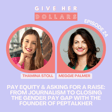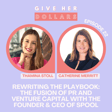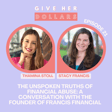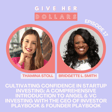Empowering Women Through Education and Community
00:00:00
Speaker
I really have centered on education and community and conversation because the more that we learn and help each other, we realize, ah, I can take bits and pieces from this person's story and experience and take bits and pieces from this webinar video course, right? And then bring it into my organization and talk to other female colleagues and together we can make a case so that nobody feels like they have to be the lone voice in standing up to the powers that be.
00:00:30
Speaker
I'm Tamina and I'm extending a heartfelt invitation to you as we join forces in reclaiming economic power for women in a world that is often structured against us.
Claire Wasserman's Journey and Achievements
00:00:42
Speaker
We'll dive into the minds of accomplished female leaders, investors and entrepreneurs to equip you with the confidence and knowledge to build wealth for yourself and other women. So buckle up, get ready to learn and be inspired to take action.
00:00:58
Speaker
Welcome back, everyone. You know what? Let me tell you something. I have a really, really good feeling about this week's episode because our guest is a good one. Yes, I am so thrilled to be welcoming the one and only Claire Wasserman to the show.
00:01:17
Speaker
Claire is an educator, author and founder of Ladies Get Paid, a platform global community and book that gives women the tools to earn more and live better.
Facing Legal Challenges and Finding Growth
00:01:30
Speaker
Claire has a master certificate in behavioral finance and financial psychology and is also the host of the John Hancock podcast called Friends Who Talk About Money.
00:01:42
Speaker
I always love having fellow podcasters on the show. I highly sought after expert for Fortune 500 companies working to improve diversity, equity, inclusion, and belonging. Claire has traveled the country teaching thousands of women how to negotiate millions of dollars in raises, start businesses, and advocate for themselves in the workplace.
00:02:06
Speaker
chosen as one of Entrepreneur Magazine's 100 most powerful women, she has spoken at places such as Harvard Business School, Facebook, NASA, and the United Nations. And Claire has also appeared on Good Morning America and in the New York Times, among others.
Redefining Work Culture and Facing Backlash
00:02:25
Speaker
Claire's book, Ladies Get Paid, is available at latest.com forward slash book and wherever books are sold.
00:02:32
Speaker
You can think of Claire as your personal cheerleader on your path to prosperity. Or as Robin Roberts of Good Morning America called her, the career coach helping ladies get paid. Wow. What a bio and introduction, Claire. Welcome to the show. Thank you. I love that you mentioned that you enjoy having fellow podcasters on. I immediately thought, oh, it makes it easier to edit. Yes.
00:02:55
Speaker
Yes, you're absolutely right. And I'm so glad that starting this year, I started outsourcing editing because I think for the first 100 episodes of my podcasting journey, including my first podcast and the second one, I was just doing it all by myself as a trained radio reporter and host, but finally got to outsource it in 2023 and just so, so happy. But let's take
00:03:18
Speaker
a step back, Claire, because I always like to start out asking my guests the same question first. As we grow older and we evolve in our personal growth, there are certain things that we often unlearn can be beliefs or perceptions.
Turning Legal Setbacks into Community Strength
00:03:37
Speaker
I'm curious to hear from you, Claire, is there maybe something significant that you personally have unlearned
00:03:42
Speaker
along your journey towards advocating for gender equity. How much time do we have here? I think it's such an excellent question to ask. It's not just about what have you learned, but it's first, what if you needed to unlearn. I think as an entrepreneur and as a woman especially, I've really had to unlearn
00:04:02
Speaker
hustle culture and kind of self-flagellation as my go-tos that I thought I needed to have to motivate me to be ambitious and to work hard and to do a lot. No. Instead, it's been about cultivating self-compassion
00:04:19
Speaker
and also sustainability, right? I'm in it for the long haul here. So in a given week, it's not just how much can I get done, but just really what's the quality of the work, but most importantly, the quality of my life that I matter in this. It's not just about the business or the movement or the people that I serve.
00:04:39
Speaker
If I am not well, then I cannot do well. So that has been the biggest unlearning and learning personally. And then in terms of just the advocacy for gender equality, the massive was I assumed that helping women get paid more.
00:04:56
Speaker
This is going to sound naive, I guess. I assumed that that was uncontroversial. Who wouldn't want more women to make more money? There's lots of statistics out there about how that benefits the economy at large. Same thing with diversity in leadership at companies. That equals an improved business bottom line. Helping women helps everybody.
00:05:18
Speaker
But I personally, and also ladies get paid as an entity, we were sued for gender discrimination by a group of men's rights activists. That was a massive wake up call to the fact that my message, which to me made a lot of sense,
00:05:34
Speaker
It made a lot of people angry too. I can't believe that you're bringing this up because a similar group of people or I think it was even a male former professor actually sued my alma mater Duke University, specifically a program that was created to benefit women, female students on campus, nurture them into STEM fields, for example.
00:06:02
Speaker
collaborations with the Women's Center on campus. And it's furious. And then I'm sure you've heard of Fearless Fun being sued by similar groups. It's just absolutely ridiculous.
Balancing Inclusivity and Profitability in Advocacy
00:06:14
Speaker
And unfortunately, to talk about politics, because this podcast is not about politics, but at the end of the day, it oftentimes comes back to that we're in a moment in time where
00:06:24
Speaker
Fortunately, it's gotten easier for these types of groups to get away with this BS, to be quite frank with you. And it's disheartened and really scary, but also a testament to the fact that we need to come closer together during these challenging times and women supporting women.
00:06:45
Speaker
is so, so damn important. And yet there's still a media out there trying to pit women against one another who just experienced it yet again in 2023 with Taylor and Beyonce constantly being compared in the media. And that narrative just doesn't serve us anymore. But yeah, I know getting sued was the best and worst thing that's ever happened to me and my business.
00:07:11
Speaker
I actually have a whole talk on how to leverage setbacks for growth. It's called How to Make Money from Lemons. We turned the lawsuit into a massive crowdfunding campaign, into a book deal, into press in the New York Times. I mean, it took a toll on us, of course, but to your point of getting support, it was the thing that really showed how important it is that we rally together and not just by saying that we support each other, but by really showing up and in our case, it was showing up with dollars through our crowdfunding campaign.
00:07:41
Speaker
We raised actually 116,000, I think close to 2,000 people in less than a couple of weeks. So that experience in and of itself was kind of a little mini ladies get paid exercise, right? Of going to the community and saying, if you want this to exist, you have to pay for it in some degree.
00:08:01
Speaker
So there were a lot of lessons in that whole thing, a lot of growth, but to the point of the unlearning and the learning, I unlearned my naivete. It was sad, but I really grew up. I thought, wow, there's angry people out there. And what a privilege that I had leading up to that to just assume that I would of course get support. It gut checked me in a really significant, hard way, but ultimately I think good. A lot of resilience came out of it for sure.
00:08:30
Speaker
Yeah, I totally believe that and thank you for sharing that story. I think it's important one to tell and important one for our audience members to hear and going back to what you're just saying about yeah, it made a lot of people angry and what you're saying initially, maybe I was
00:08:46
Speaker
So naive to believe that talking about getting more money into the hands of women wasn't going to be anything controversial, but it turns out it is. And I also love the point that you made about there's all of this data, there's
Monetizing Advocacy Work
00:08:59
Speaker
all of these studies out there that prove that getting more money into the hands of women actually
00:09:04
Speaker
Doesn't only benefit women but our society and our planet as a whole for a variety of different reasons right companies that have more female or more diverse representation in their c-suite and on their boards are financially more successful than less diverse companies right so it's a little bit.
00:09:26
Speaker
this hardening, because at the end of the day, what that means is that it's not necessarily just about the money, because if it truly was about the money, we would have more than just 2% of all venture capital dollars going to female funded companies who on average return more than their male peers, right? So at the end of the day, it's all about power.
00:09:46
Speaker
and people just not wanting to give up their inherent power. Yeah. And when I started Ladies Get Paid, it was reading these statistics around the wage and the leadership gap and thinking to myself, okay, to affect change, that requires policy change. It requires government policy change. It requires company policy change.
00:10:07
Speaker
But that kind of change is going to take time and patience, two things that I don't really have. What can I do to help arm women, right, individuals with the tools and the talking points to both improve their own lives and bank accounts, but also kind of act as little sort of Trojan horses in these companies?
00:10:29
Speaker
so that they can, from a groundswell grassroots level, go in and advocate for better paid family leave policies, for example. It's not going to happen top down, because unfortunately, well, if it was going to happen top down, it would already have happened. So the people who have the most incentive, the most to gain, it's the employees. So how could I help them? And that's why I really have centered on education and
00:10:56
Speaker
community and conversation because the more that we learn and help each other, we realize, ah, I can take bits and pieces from this person's story and experience and take bits and pieces from this webinar video course, right? And then bring it into my organization and talk to other female colleagues and together we can make a case so that nobody feels like they have to be the lone voice in standing up to the powers that be.
00:11:21
Speaker
Absolutely. Community is so, so important. And we're going to talk more about community later. But I feel like this was already, again, such a great start to the conversation, Claire. But obviously we have a lot of ground to cover. We just heard in the intro.
00:11:36
Speaker
that you've spoken in all of these incredible places. We talked about the book deal as a result of the lawsuit that you experienced. Now you're able to, I guess, turn rejection into redirection. You've been featured in some of the biggest news outlets, New York Times, Good Morning America, and so on.
Adapting Business Strategies for Sustainability
00:11:54
Speaker
Super, super impressive. So I would say on paper,
00:11:58
Speaker
You seem to be very, very successful, Claire. But then based on a recent, very vulnerable LinkedIn post that you shared, perception and reality are often two very different things. So what I would like to do, I would like to read out parts of that post that you shared to our audience, if that's okay with you.
00:12:19
Speaker
Okay. Yeah. This post was hard to write, but I'm glad that I did it. Thank you for including it today. Yeah. And the reactions on that post, I mean, testament to the power of sharing and being vulnerable. So thank you for that. All right, folks, everyone, listen up. I'm going to read out parts of that post that Claire wrote a couple weeks back. So here it goes. This is for anyone who feels like shit on their birthday. For the first time in my life,
00:12:49
Speaker
It's me, in full transparency.
00:12:51
Speaker
I am not where I want to be financially in my life. It especially pains me to say that as the leader of Ladies Get Paid, the one who champions others to be financially empowered. But here I am, feeling very much financially disempowered. Ironic, isn't it? For so long, my desire to help as many people as possible made it hard for me to charge as much as possible.
00:13:19
Speaker
Inclusivity seemed incompatible with profitability. All right, let's sink in for a hot second. You know, Claire, this is a podcast where we normalize women having conversations, very candid conversations about money and wealth creation. So my question to you, Claire, is where are you and where do you want to be financially?
00:13:43
Speaker
And I wanted to be hella unapologetic about it. Yes, yes. Well, first I always say that I created Ladies Get Paid because I needed Ladies Get Paid. So anytime that I'm struggling with something, I go and I try to learn as much as I can about how to solve it. And then I use that to help others, right? So I kind of look at myself as just one step ahead of the community.
00:14:06
Speaker
Not many, many steps, but just one step ahead. But there was a step that I have fallen behind in my own work and that is making a ton of money from my business. We're still in business. We've been around since 2016 and we've navigated this devastating lawsuit and a pandemic and
00:14:26
Speaker
a number of other things. So again, that's a success in and of itself to still be here. And so for anybody else who's out there who's just scraping by, but you're still standing, I see you and you're doing great.
00:14:39
Speaker
But when your message is get paid and then you look at your own bank account and you go, there's a disconnect between how much I'm getting paid and also my fear around charging more, that's hypocritical. At some point, it's not just disappointing. It's, I mean,
00:14:57
Speaker
kind of fucked up. So not just for me, but also, again, the message of it all. So in short, I look at what I started with, which was everything pretty much free or inexpensive. Because I want to help as many women as possible. I want to combat the wage gap. It seemed to me to have any kind of barrier to entry would be a contradiction to my mission.
00:15:24
Speaker
In the beginning, of course I want things to be free and inexpensive. How do you make money then? Well, we made money and we made quite a bit of money from brand sponsorships. So this is a little bit of a business lesson for folks, entrepreneurs who are out there who are listening to this. We did extremely well when it came to these kinds of partnerships, whether they were for our conference, me personally, programs that we ran, pandemic happens, and guess what? All those budgets get slashed. And this is the danger of when you rely on
00:15:53
Speaker
kind of one revenue stream.
00:15:55
Speaker
heavily on one revenue stream. Then we looked at everything and we go, oh gosh, we got to figure out if it's not coming from the brands, it's got to come from the members. We thought, well, we've got over 55,000 people in our community. People will pay us. Of course, you have to give them something of value. It's a little hard though when you have trained people to always get everything for free. We did a number of things. We packaged up our video courses because everything was online. We had over 100 hours of educational videos that people could watch.
00:16:25
Speaker
Experiments with group coaching, member matching, discounts, started to charge for things, then we would give discounts. Now we have a really big video course out there on salary negotiation. There's a lot of experimenting that we're doing around charging for our services, but we've unfortunately found ourselves kind of stuck in that
00:16:44
Speaker
Again, it's been six years of people always getting things for free or very, very cheap. And so even though we believe we are offering opportunities of high value, it might not be the audience anymore that we can, our community, this community will not pay us. And it's not to say that
00:17:04
Speaker
We're done in any way, shape, or form. I mean, of course, we've got a Slack group, we have a Circle group. I mean, they've exchanged over 3 million messages in there. It brings a lot of value, but it's not sustainable. So we just have to know its place. And this is really great advice that I got this morning, actually, from the founder of an organization in Canada called Moms at Work. And she said to me,
00:17:26
Speaker
You might need to broaden your audience to attract those that will pay you. You're almost starting over in a sense. You also need to be making sure that you're providing something that people are deeply needing. Not just wanting, but deeply needing.
00:17:43
Speaker
Are you sending out surveys? Are you getting feedback from them? Are you having transparent and potentially difficult conversations? Things like, why did you not purchase? You came to this free webinar. You said you loved it. But then you didn't buy my video course after. I would love to hear your feedback. We did market research. We felt it was the right price point. We're making all of these guesses about why we think something's going to work. And then it doesn't. It can sometimes be difficult to isolate the variable of why it didn't work.
00:18:11
Speaker
And a way to get an answer is simply by asking. And it has to take courage to do that. And also not being afraid to maybe announce that you're making a change. Hey, listen, we're going to keep this free service here, but we're also going to be doing this high price point thing because we are a business that would like to stay in business.
00:18:31
Speaker
And kind of drawing a line in the sand, and part of a way to feel, I think, courageous in doing that is remembering that you were setting a good example for others to do that, which kind of circles back to my original kind of ojita around all of this, which was this hypocrisy I felt like in that disconnect of, ladies get paid, and I'm teaching you how to negotiate, and stand up for your worth, and then me over here, oh, am I charging too much? Maybe we shouldn't charge at all.
00:18:57
Speaker
I kind of have to walk my own talk in a really meadow way. And speaking of unlearning, yeah, you got to unlearn the martyrdom that a lot of us maybe feel of. But if it's good for the world, then I should just give it away. Again, sustainability. I want to continue to do this throughout the years.
Resilience and Adaptation in Advocacy
00:19:15
Speaker
So I have to charge more. I have to be getting paid more. And it's a difficult band-aid to rip. Absolutely. I really appreciate you allowing us to get a peek behind.
00:19:26
Speaker
the scenes because again, a lot of people, myself included, I have a lot of very successful friends who've built some awesome stuff. And what we see on social media is not always what actually happens behind the scenes.
00:19:41
Speaker
Well, things change. That's the thing. We have built a huge community, a thriving community. I had an amazing book deal. I've been in a ton of press. I've gotten paid a lot of money to speak. We've run successful programs. We've had huge brand deals with Secret Deodorant and Nike. And all of that is true.
00:19:58
Speaker
But then the pandemic happened. Things changed. That's the thing that I want everybody to really learn are the skills for resilience and pivoting. And because just because something's working in one capacity, you have a great job and you love it. And guess what? Next day you're fired.
00:20:14
Speaker
What do you do? And also who are you? The identity crisis that can come with that too. Or you have a health issue or we're about to have twins. Life changes. So I think that's what we all need to be prepared for is that nothing stays the same. How do we not only prepare for it, but even embrace it too.
00:20:35
Speaker
Absolutely. It's so fun because everything I share right now reminds me of an upcoming speech I'm giving to a group of university students and it's all about the digital transformation of the workforce and a lot of the things that I will be talking about is about
00:20:50
Speaker
the future of work, the great reshuffle. The pandemic has only accelerated all of that. What we really have to become comfortable with is just embracing the fact that we need to be first lifelong learners. We have to have a growth mindset and we need to be ready to constantly reinvent ourselves because
00:21:10
Speaker
We don't live in a time anymore where you have the same job and you work at the same company for 40 years straight. Things change. Look at everything that's happening with AI right now. You have to adapt. I have to adapt. Everyone has to adapt if you want to end up being successful or if you want to continue to be successful. I'm really glad that you brought that up there. But it also reminds me of a lot of the conversations I have with my female friends.
00:21:39
Speaker
all going back to your post in that last sentence that I was reading out earlier, inclusivity seemed incompatible with profitability. That's so, so painful and almost triggering to me because again, it reminds me so much of what I hear from so many women who are touching the DEI space in some shape or form. When you make your passion and your purpose, your job, many of us ultimately end up paying the passion tax. Shout out to my dear internet friend, Erin Gallagher,
00:22:09
Speaker
who always likes to put it that way. I love that because it's exactly what it is. It is a passion text and people exploit that all the time. The number of times people have requested for me to speak for free all the time.
00:22:26
Speaker
We're like, oh, but you're so passionate about this. And I'm like, oh my goodness. Speaking is a skill. It's a service that you provide. Do you go out to your doctor or are you going to hire an electrician and expect from them to show up for free? No, of course not.
00:22:45
Speaker
And yes, we should all ask for what we deserve. We know that by now, but it's easier said than done when let's say a Harvard Business School or the United Nations call, right? Well, I also think the, so I always say get paid what you deserve, but how do you know what you quote deserve? It's such a loaded thing. There's of course the
00:23:06
Speaker
straightforward of what's the current market rate, where you're doing research from real people about how much they're getting paid, and they have to be comparable to you. So this is when I really encourage for us speakers, we need to be talking to each other about rates. So that's the current market research, which is more straightforward. But of course, the tricky part is the internal, you have to believe that you're then worthy of that market rate. Let me give you a quick example. I led a workshop the other day on
00:23:35
Speaker
Salary myths and mistakes that I see salary negotiation myths and mistakes I see a lot of people make and one woman wrote in and she said Her mother she's a first immigrant first generation immigrant her mother is a housekeeper and she is a lawyer and she said I have a difficult time and
00:23:51
Speaker
When I look at legal salaries, it actually makes me feel ill because what I make in a week, my mother's never seen in a lifetime. And instead of that empowering her though to ask for more, it actually made her feel guilty about asking.
00:24:10
Speaker
So that was a big reason why I went and I got my master's certificate in financial psychology because I realized you could give people information, but that's not going to be why they take action on that information. It's ultimately going to be how they feel about it and how they feel about themselves.
00:24:28
Speaker
So the only way in my mind that we all can continue to move forward in this space is by continuing to talk about it, continuing to share personal stories, continuing to be transparent.
Financial Mindset and Empowerment
00:24:39
Speaker
And that also includes how we respond if somebody tries to exploit our services, right? And a lot of people in the arts, they absolutely feel this way too, I know. And it's teachable moments, right? It's saying, hey, if I were to not charge for this,
00:24:55
Speaker
That's undervaluing myself, but also making it harder for anybody to get paid. In good conscience, I can't say yes to this. So if it's difficult for anybody to stand up for themselves, just channel us here, right? Do it for us. Do it for other people. And also, chances are the person you're negotiating with
00:25:16
Speaker
they might be insecure about negotiating for themselves, actually. I mean, there's a boss they got an answer to, too, right? So maybe look at it as a moment where you can inspire them by the way that you comport yourself. Yeah, absolutely. And I think it was so important for you to bring up
00:25:32
Speaker
how our upbringings play into all of that because there are some studies that I've personally read and I know that Tori Dunlap from her first 100K always brings that up as well. Your relationship with money is cemented very early in life, as early as age seven or something crazy.
00:25:51
Speaker
So when you grew up in an environment where your parents, your family didn't talk about money or there wasn't any money to begin with, so therefore money has become a stressor, that baggage can last way into your 20s, 30s, 40s, or even accompany you for the rest of your life. So going back to the example that you just shared about the daughter of an immigrant,
00:26:16
Speaker
who now makes a lot of money and feels guilty about it because her mom never made even remotely as much money. That's a lot of trauma that people need to work through first and moving away from having that scarcity mindset towards moving towards more of an abundance mindset. It doesn't happen over overnight.
00:26:38
Speaker
But we gotta start somewhere. That self-compassion piece is so important because you might be like, I read the books. I'm doing the thing. Why is this not changing? And maybe it's not about the math. It's about the mindset. And there are so many things that you can do for that, but you have to do them consistently.
00:26:55
Speaker
Absolutely. Love that. Claire, let's pivot a little bit because I want us to focus on the positive as well. To me, 2023 has been a hell of a year, but it was also the year of the female economy. Between Barbie, Beyonce, Taylor Swift, the Women's World Cup, we can argue that women have single-handedly saved the US economy this past summer.
The Female Economy and Consumer Influence
00:27:20
Speaker
So I feel we're finally having
00:27:22
Speaker
this mainstream moment where society is starting to realize, hey, there actually is power behind the female dollar, even though women have controlled consumer spending for many, many years. This is nothing new, but we're finally starting to talk about it, right? Interested to hear from you, Claire, what are some of the trends in the female economy that you are particularly excited about?
00:27:45
Speaker
I think that those examples that you gave, right, the Barbie and the Taylor and the Beyonce, and I'm glad to say that I have gone to all three, we just need to be making more things from the female perspective. I was going to say four women, but I think clearly men went and enjoyed these things as well. So I wouldn't say even it's four women.
00:28:04
Speaker
But I just think the female perspective, it's been missing behind the director lens, behind the business decisions. So again, it's not just about women on stage, right? It's about women in the boardroom, Beyonce and Taylor, getting complete command of how they are making money and the way that they're running their business and the relationship they have with their fans.
00:28:25
Speaker
You know, Barbie, it's not just about Barbie starring Margot Robbie, but it's Greta Gerwig making it, right? So at the point of who's in the leadership position here, and clearly that pays off big time. A lot of men got a lot of money out of all of this too, to circle back to the whole point of good things happen for everybody when women make money.
00:28:46
Speaker
So I'm really optimistic or I guess maybe I should say I'm hopeful that we're going to see more things from the female perspective and we're going to continue to give our dollars. And that I hope other people realize if there's something out there that you think is great, please put money behind it. Go show up to the theater for that film by the female director, right? So don't just say, I'll wait when it comes out because
00:29:14
Speaker
There's people who are looking at that balance sheet and you can not just help that woman, but help the rest of the future of how we understand the economy or the, let me just start over and you'll edit this part out. You're not just helping that one person in putting your dollars behind it. You were sending a message to the entire industry that you want to see more of this thing being created.
00:29:37
Speaker
So give yourself more credit. It's not just a movie ticket that you're buying. Absolutely. And I think it's also important to put your money where your mouth is to be quite frank. I think there is a lot of people out there who, you know, in theory are very much behind the idea of supporting women and gender equity and, you know, creating a more equitable world in general. But
00:30:01
Speaker
We all know money is power and I always like to say in my audience might be sick of this already but because I bring it up all the time but I always like to say a wealthy woman can walk out of almost every room she feels uncomfortable in and create opportunities for other women along the way. Having money allows women to say no.
00:30:24
Speaker
to men. There's also this component of oftentimes women and thinking about this because last night I went to this movie screening of Show Her The Money, which is a documentary film about how horrendously broken the VC ecosystem is and how only 2% of all VC dollars go to female founders, right? And it's just a fact that oftentimes women and minorities
00:30:51
Speaker
focus on solving problems in this world that were historically overlooked or ignored. So if we really want to see sustainable change in this world, that's where we got to put our money. It's as simple as that. It's a preach period. That's it. Could have a whole separate conversation and podcast episode just about that topic alone.
00:31:20
Speaker
But yeah, Claire, let's talk a little bit about community again, because I feel a community has come up over and over and over again throughout this conversation. We talked about it earlier in context of your lawsuit. Obviously, ladies get paid is this very vibrant community of you have about 130,000 people who follow you on Instagram, which is incredible. You have over 45,000 newsletter subscribers. So.
00:31:48
Speaker
You know, I would argue that you and your co-founder and wife, Ashley, you two know a thing or two about building community and creating an online business or a business that previously was more focused on in person, but then pandemic happened. And then we talked about that shift earlier, right? And you also support your community and the many women in your community.
00:32:14
Speaker
with all of that through your course offerings. If you had to start from scratch and let's assume you have zero followers and zero subscribers, where would you focus your time and energy and how
00:32:30
Speaker
can people be innovative and stand out in the crowd today? If I were to start over, I would do everything exactly the same, except I would very much sooner have a high price point offering. And it wouldn't be the thing that is the only way that you would engage with ladies get paid. There would still absolutely be either free and or inclusive offerings or price points. But I would want to start from the beginning
00:32:59
Speaker
training people to see, ah, if you want more, you have to pay for
Building Resilience and Navigating Change
00:33:06
Speaker
more. Whether it is cohorts, accountability groups, so much more intense offerings, at least from a bandwidth perspective on my side, that I would be putting into it. But I would also be charging quite a bit for it and not be afraid to do that. I think we have waited too long.
00:33:26
Speaker
not to say that we're screwed, but it has added challenges for us because of how long we've waited. So that's the only thing that I would have done differently. But that being said, let's all be realistic, right? I started this by myself. I didn't bring on my co-founder until at least a year into it. And it's also just us. We don't have employees. So there's only so much you can do. That's why I want us all to forgive ourselves a little bit. Could've should've would've, but did you have the time and energy for it? And if you didn't, then
00:33:55
Speaker
this is just where you're at and what's the next decision you're going to make for today. Absolutely. And sometimes, to be quite frankly, you also just need a little bit of luck sometimes. Timing is huge. Timing is absolutely huge. I feel you've been in this game for quite some time now since 2016 and there's been
00:34:16
Speaker
so many incredible women influencers popping up over the course of the pandemic like out of nothing and a lot of them have like very successful thriving multi-million dollar businesses now things have changed the vocabulary has changed influencer was not a word when I started this the wage gap people weren't even talking about it when
00:34:37
Speaker
when I began doing this in 2016, we'd even think about, we all thought Hillary Clinton was gonna be the president. I mean, so much from like a macro sentence has changed. So, I mean, Zoom, I think it existed, but it wasn't part of the vernacular. So I think that all goes back to a thread that we've been pulling throughout this conversation, which is ready for change. Build your resilience.
00:35:02
Speaker
And that's asking questions, getting support, being brave, being, getting sleep, being kind to yourself. I just think that is the best takeaway for all of us, whether you were an entrepreneur, an advocate for gender equality, or just simply want to make a shit ton of money. Like flexibility is everything. Absolutely. I think in that sense, the pandemic was almost a blessing in disguise because it has helped a lot of us to
00:35:30
Speaker
take a step back, reflect, and really reevaluate what's actually important to us in
Policies for Women's Economic Upliftment
00:35:38
Speaker
life. Yes, I agree. Wholeheartedly.
00:35:41
Speaker
No, absolutely. Claire, I would like to wrap up with the following question. I want you to imagine that you had the power to enact a single universally binding law that every organization must obey and it must be specifically designed to uplift women's economic status.
00:36:03
Speaker
Claire, what law would that be? Well, since my cause is the wage and the leadership gap, there's a number of factors that contribute to it. But it really all boils down to one, and it's called the motherhood penalty. So when women have children, they are often, unfortunately, hit with a reduction in pay. They leave the workforce, have a hard time getting back into the workforce. And then once they're back in, moving up and making what they deserve, paid family leave and universal child care.
00:36:33
Speaker
I have a best friend who now lives in Germany. She married a German man and she had two kids. She's like, I'm not coming back. Social service is too good. So, you know, I kind of looked at her and I'm like, that, that sounds nice every time, especially since I'm about to be a mother, paid family leave and universal childcare.
00:36:51
Speaker
in any iteration, shape or form, subsidized childcare, something. So again, for all how insurmountably difficult and complicated and never-ending this all seems, it's actually not that crazy. If we could focus our efforts in that paid family leave and universal or subsidized childcare space, everybody will benefit.
00:37:15
Speaker
Yeah, absolutely. I love that you bring up this example because I'm actually from Germany originally and obviously to immigrate to the United States and sometimes I'm like...
00:37:26
Speaker
She did the opposite of you. She's like, I'm getting out of here. I'm going to Hamburg. Hamburg is a beautiful city though. So I can, can, can really blame her for wanting to stay there, but it's beautiful childcare. Yep. Beautiful childcare. And it's kind of heartbreaking, but I think you were for this season alone, you're probably the third or fourth person to bring that or a version of it up healthcare and maternity leave.
00:37:51
Speaker
Yeah, it's... It's solvable though. It's frustrating because it hasn't happened, but it's kind of nice to know that there are some solutions out there and there's also a lot of other countries that have proven that it works. Again, there's no one size fits all. Same thing with career advice, salary negotiation. There isn't a formula and it's going to poof, everything works. You take bits and pieces of it and you filter it through your specific context.
00:38:16
Speaker
So I'm just really grateful to you for the work that you're doing, but also having all these different voices on so people can take what makes sense and resonates with them and their situation from this. So thank you for the opportunity. And by the way, if anyone wants to learn more about the lawsuit that you can go to ladiesgetsood.com and you'll really see how we made money out of lemons. I mean, we did a whole branding campaign, a limited edition podcast series. We had merch and let that be a lesson to everybody.
00:38:45
Speaker
You can, it's not just about surviving the bad shit. It's how do you leverage it for awesome shit? And I still see that with, again, the wage and leadership gap with we've built careers out of something that's horrible. Rallying community, people now don't feel alone. Like what a gift. So if somebody's listening and wherever you're at in your career and we're looking at your bank account or in the advocacy you work that you do, there's so much opportunity in it.
00:39:15
Speaker
I couldn't imagine better words to close with today. Claire, thank you so so much for first of all joining me but then also being so candid and vulnerable and all of your positive energy and then obviously most importantly for all the incredible work that you do for the community. You continue to serve every single day
00:39:38
Speaker
it does make a big, big difference. And I'm so grateful that our paths have crossed and looking forward to continuing to cheer you on along the way. Thank you so much. And if anyone wants to get this lady paid, you can go to ladiesgetpaid.com slash get paid. You'll see our brand new salary negotiation video course. It's also a membership. And for me personally, Claire Wasserman dot com. I'm Claire Wasserman on LinkedIn and Claire gets paid on Instagram.
00:40:06
Speaker
Thank you so much. Thank you. And we'll make sure to link to all of these incredible resources in our show notes so you all can just click away and follow Claire. Thank you.
00:40:20
Speaker
Hey there, not so fast. If you enjoyed this episode, please consider leaving a 5-star review on Apple Podcasts, Spotify, or wherever you've listened in from today. Reviews are a podcaster's most important currency. It helps me create visibility for the incredible women who join me on this show. And if you've made it this far, I'd like to believe that supporting women is one of your favorite pastimes.
00:40:45
Speaker
If you already left the review, first of all thank you, but why not share this episode with a friend or post it to your Instagram story? Thank you for helping me on my mission to make women rich by making women rich.




















